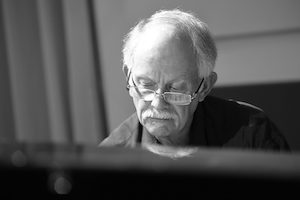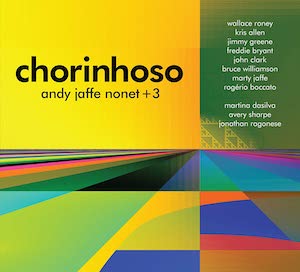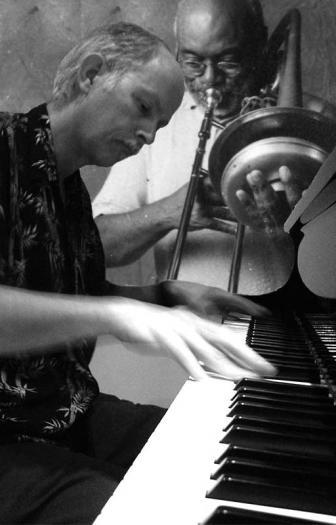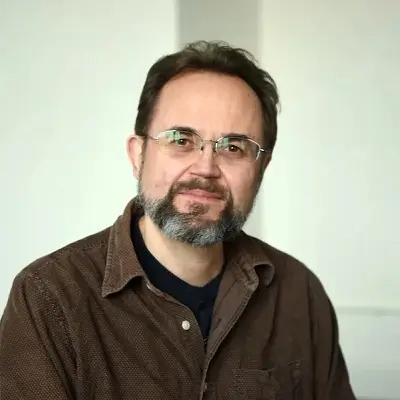Imagine using your language skills to understand, perform, and teach the music you love at home and abroad.
Andy Jaffe is a composer, arranger, pianist, author, and educator who lives in Conway. His wife Gisele Litalien is Associate Director of Center for Research on Families at UMASS and founder of the Valley Jazz Choir. Their three children are all professional musicians, too.
wife Gisele Litalien is Associate Director of Center for Research on Families at UMASS and founder of the Valley Jazz Choir. Their three children are all professional musicians, too.
In our conversation we talk about teaching Brazilian music in Taiwan, the bustling jazz scene in Taipei, and the importance of understanding the cultural context of music.
Could you just tell me about yourself and your experiences learning Portuguese and Chinese? What were your reasons to learn Portuguese and Mandarin?
I’ve always been interested in languages. Studying Portuguese is one of the things I’ve been doing for a long time, but it wasn’t until I got to ILI that I became serious about it, first with Samira and then Marco. They’re both outstanding teachers.
One of the main reasons is because I play a lot of Brazilian music. I’ve been to Brazil to hang out with musicians, and it’s a very important part of my personal musical development.
For Chinese, it’s more pragmatic. I’ve wound up going to Taipei quite a bit. I did two sabbaticals in Taiwan, and then afterwards I got offered a job there. Studying Chinese I don’t do through ILI, but through a referral that I got through Caroline [Executive Director of ILI]. I wouldn’t have had that opportunity without ILI either.
I’ve also done some language exchanges. ILI has Taiwanese or Chinese students who are in the Valley for a short period of time working to improve their English.
Could you talk some more about your music and how it connects to why you learn Portuguese and Chinese?
I spent a lot of time in academia. I taught in the Valley, first at Amherst, a little bit at the UMass Graduate School, and in the Five College system from ‘87 till about ‘99 when I became full-time at Williams until I retired.
I developed jazz programs at all these places from scratch because there wasn’t anything. At the time they mostly all shared too familiar anachronistic, Eurocentric biases that predominate at most liberal arts music departments.
I’ve also been teaching since 2011 the Vermont College of Fine Arts, which is a real all comers, any style of music place up in Vermont. We bring in resident ensembles to play the students’ work. It’s nice to be considered a composer and teacher of composition more generally, rather than being pigeon holed as “the jazz guy”.
But my main passion is composition, bandleading, and recording. I’ve tried to squeeze that in whenever I could since I retired in 2017. I’ve had two more CDs come out since then. The last one Chorinhoso was Brazilian music that I wrote.
in whenever I could since I retired in 2017. I’ve had two more CDs come out since then. The last one Chorinhoso was Brazilian music that I wrote.
Could you talk some more about how learning Portuguese and Chinese connects with playing and teaching Brazilian music?
In Taipei, I have a gig at a university where I teach basic musicianship and basic jazz harmony. Last fall when I was there, I was performing almost every night. They have so many clubs. There is a huge expat population because when everything was shut down here, a lot of the musicians who had any connection there through a work permit or a family connection went back.
So, the scene was very rich with ex-pats last year. There are so many places to play. I was a lot busier there than I ever would be in the Valley.
The only place I could be busier would be New York, and I wouldn’t be able to afford it nor would I be able to compete with my son’s level of young lions that is evolving. I have three kids and they’re all better musicians than me.
My oldest, Ceora, is a classical flute player. She just did her first gig in a year and a half playing with an orchestra in New Bedford, but she’s still been teaching a lot. My oldest son Lysander is a violinist and violist, and also does Balkan music and lots of other genres. He’s in a chamber group called Palaver and runs a choir. He can improvise, he’s a good composer and arranger, and a good tenor singer too.
And my younger son, Marty, is one of the best young bass players in New York. It’s interesting to be a fly on the wall to see what’s happening with him and his younger colleagues who are not household names yet, but will be soon. It’s kind of frightening. I went to New York to pick him up a couple of weeks ago because he had a gig up here and I sat in with him and it was like, oh my God – what am I doing here? I felt good. It was a lot of fun, the environment, all that is unique in New York, and I do miss it.
Could you talk some more about how you use your Portuguese speaking skills and Chinese speaking skills? Basically, you use Portuguese and Chinese to teach and play Brazilian music in Taiwan, right?
Yeah. There’s a huge expat community of Brazilians in Taipei, and I get to play in a couple of Brazilian bands over there. It’s a pretty international city, so there was a lot of opportunity to mix with all different kinds of people. It’s cheap, and there’s no crime.
When I was teaching a Brazilian music class in Taipei, it was always a mixture of teaching them enough Portuguese words for the musical terms, some of which are unique to Brazilian music, some of which are more generalized, and translating that as necessary into Chinese or trying to approximate it.
I did show them quite a few videos that were very interesting. They’re a very video-centric culture, you know? For example, when we were studying the origins of bossa nova, there’s a nice video of Jobim discussing it, which is very romanticized and personal. Then there’s another one that I use from Sixty Years of Bossa Nova from the television station in Rio. That I had to pause and translate as it went along because there were no subtitles.
How has learning Portuguese or Mandarin informed or changed your perspective?
When I first started studying with Samira Artur here at ILI, I was teaching a Brazilian music class at Williams. I should caveat this by saying that I already speak French and had spoken Italian pretty well in the past, although I kind of lost it. So, Portuguese came easily to me in terms of reading.
I’ve been able to access a lot of academic articles and interviews in Portuguese. I go on YouTube, I see an interview with Jobim, for example. I don’t trust most American musicians when it comes to Brazilian music. Because I’ve played it, I know what it feels like and how the mechanics of it work musically, but it’s nice to be able to access the music of people who are actually there doing it. And we do have friends in Brazil as well.
I’m a firm believer in cultural context when you’re studying music. It doesn’t exist in a vacuum, you know? And you can’t really understand the music without the language.
What aspects of learning Portuguese for learning Chinese have you struggled with the most?
Let’s begin by just starting with Portuguese. If you know another romance language like Spanish or Italian or French, you can figure out the cognates and make sense out of it.
Pronunciation is a whole other thing, especially in Brazil, because they have inflections and ways of pronouncing words that are unique. You really have to work at the sonic aspect of it. I’m not that great at tone production.
With Chinese the major problem for me and for anyone is going to be the pronunciation. A syllable will have four different tones that can mean totally different things. Sometimes context will save you and will make it obvious what you have in mind. But there are other times when you have to get it right or people won’t know what you’re talking about.
How long did you–or will you–need to speak Chinese fluently or speak Portuguese fluently?
I’m four years into studying seriously. I dabbled a bit before then. I would say it’s hard to put a number on it, but I’m getting pretty close to being able to communicate and read and get by in Portuguese, even though my grammar is often fractured. In Chinese, I can make myself understood for basic daily tasks and for teaching, but I’m nowhere near fluent.
Would you recommend others to learn Portuguese or learn Chinese? Why?
My family on my father’s side in every generation has had Alzheimer’s or dementia. If you keep your brain active by learning new skills, learning new music or writing new music, or especially studying languages, you’re building new neural pathways. It’s just good for your mental health generally.
keep your brain active by learning new skills, learning new music or writing new music, or especially studying languages, you’re building new neural pathways. It’s just good for your mental health generally.
I’m so interested in history and culture and studying these languages, their relationship to the music, and the people who are involved.
You can learn more about Andy’s music at his website. His recent CD of Brazilian music, Chorinhoso, is available on Amazon.
Read more about how to learn German, Spanish, and other languages:
